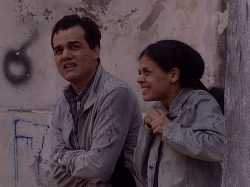(The Hour of the star)
(Digital Betal, 40 min, color, 2003)
|
Episode of the "Cena
Aberta" (Open Scene) series for TV Globo.
Macabéa, a nineteen year-old immigrant from the backlands of
Alagoas, lonely and working as a typist in Rio de Janeiro, loses her
job and her boyfriend, and, after leaving a fortuneteller, is ran over
by a car and dies. This is the ending of Clarice Lispector’s novella,
but it’s only the beginning of the story, told by many other
Macabéas. PHOTO by Roberto Henkin:
|
General Supervisor: Jorge Furtado
Directors: Jorge Furtado, Guel Arraes and Regina Casé
Executive Producers: Nora Goulart and Luciana Tomasi
Written by: Jorge Furtado and Guel Arraes
Cinematographer: Roberto Henkin
Art Director: Fiapo Barth
Diretora Assistente: Ana Luiza Azevedo
Editors: Giba Assis Brasil and Alfredo Barros
A Globo TV production
of a Casa de Cinema PoA realization
Main Cast:
Regina Case (Apresentadora, Gloria, Cartomante)
Ana Paula Bouzas (Macabea)
Wagner Moura (Olimpico)
Reviews
![]() "The
extra step Cena Aberta proposes for Brazilian TV drama has in it an
incentive for literature. How many people sought The Hour of the Star –
even the book itself was a character – in libraries and bookstores
after the episode? In a country with so few readers and writers such as
Brazil, dealing with the subject on prime time TV is courageous work.
Cena Aberta runs the risk of looking like a literary program,
restricted to the initiated. It is not. It is good entertainment,
offering much more than triviality".
"The
extra step Cena Aberta proposes for Brazilian TV drama has in it an
incentive for literature. How many people sought The Hour of the Star –
even the book itself was a character – in libraries and bookstores
after the episode? In a country with so few readers and writers such as
Brazil, dealing with the subject on prime time TV is courageous work.
Cena Aberta runs the risk of looking like a literary program,
restricted to the initiated. It is not. It is good entertainment,
offering much more than triviality".
(Marcelo Perrone, ZERO HORA, Porto Alegre, 23/11/2003)
http://www.clicrbs.com.br/jornais/zerohora/emaisummontedecoisa.html
![]() "This
is, in fact, novel in this kind of adaptation – the physical and useful
presence of the book. (...)The girls’ statements distanced the
adaptation from a merely literary game, taking it back to TV, contrary
to what the archive interviews with Clarice about her work did.
Literature was in the middle of it all, and it helped build a quality
TV program".
"This
is, in fact, novel in this kind of adaptation – the physical and useful
presence of the book. (...)The girls’ statements distanced the
adaptation from a merely literary game, taking it back to TV, contrary
to what the archive interviews with Clarice about her work did.
Literature was in the middle of it all, and it helped build a quality
TV program".
(Haroldo Ceravolo Sereza, O ESTADO DE SÃO PAULO, 20/11/2003)
![]() "CENA
ABERTA / Open Scene is another welcome new idea in television. (...)It
has managed to sound interesting even when it’s retelling Clarice
Lispector’s story in a few scenes, intertwining short and impressive
snippets of interviews with the author. In the end, it respects
Clarice’s decision and does not let the audience go to bed sad with the
story. Or sad with Brazilian television".
"CENA
ABERTA / Open Scene is another welcome new idea in television. (...)It
has managed to sound interesting even when it’s retelling Clarice
Lispector’s story in a few scenes, intertwining short and impressive
snippets of interviews with the author. In the end, it respects
Clarice’s decision and does not let the audience go to bed sad with the
story. Or sad with Brazilian television".
(Ulisses Mattos, JORNAL DO BRASIL, Rio de Janeiro, 19/11/2003)
http://jbonline.terra.com.br/jb/papel/cadernob/2003/11/19/jorcab20031119009.html
![]() "But
then comes the last surprise of CENA ABERTA / Open Scene, Clarice
Lispector in the flesh, on the screen, in archive footage, melting her
makeup like a bona fide Macabéa. She is hurt all over, like the
character. Something the guest Northeastern women actually rehearsed,
but couldn’t do. Not for lack of universal pain – Tolstoy lives in all
of us -, but for excess of meta-language and busy bodying by narrator
Casé. Even when she was crossing the street against traffic, we
hear ‘call a stunt double’ – a joke that doesn’t suit well with
Clarice’s mysteries. Brechtian distance out of place and out of time".
"But
then comes the last surprise of CENA ABERTA / Open Scene, Clarice
Lispector in the flesh, on the screen, in archive footage, melting her
makeup like a bona fide Macabéa. She is hurt all over, like the
character. Something the guest Northeastern women actually rehearsed,
but couldn’t do. Not for lack of universal pain – Tolstoy lives in all
of us -, but for excess of meta-language and busy bodying by narrator
Casé. Even when she was crossing the street against traffic, we
hear ‘call a stunt double’ – a joke that doesn’t suit well with
Clarice’s mysteries. Brechtian distance out of place and out of time".
(Xico Sá, FOLHA DE SÃO PAULO, 19/11/2003)
http://www1.folha.uol.com.br/fsp/ilustrad/fq2011200320.htm
THE CASA | FILMS | PROJECTS | LINKS | NEWS | CONTACT | HOME | EM PORTUGUES | EN ESPAÑOL
